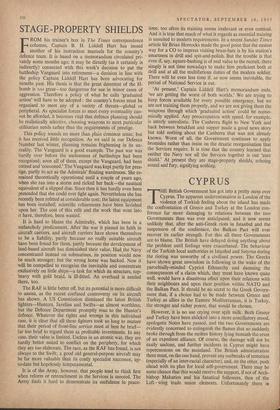STAGE-PROPERTY SHIELDS
FROM his trainer's box in The Times correspondence columns. Captain B. H. Liddell Hart has issued another of his instruction manuals for the country's defence team. It is based on a memorandum circulated pri- vately some months ago; it may be directly (as it certainly is indirectly) connected with this week's decision to put the battleship Vanguard into retirement—a decision in line with the policy Captain Liddell Hart has been advocating for months past. His thesis is that the great deterrent of the H- bomb is too great—too dangerous for use in minor cases of aggression. Therefore a policy of what he calls 'graduated action' will have to be adopted : the country's forces must be organised to meet any of a variety of threats—global or peripheral. As specialist forces to meet every eventuality can- not be afforded, it becomes vital that defence planning should be realistically selective, choosing weapons to meet particular utilitarian needs rather than the requirements of prestige.
This policy sounds no more than plain common sense; but it has received little recognition. As we said in our Defence Number last winter, planning remains frightening in its un- reality. The Vanguard is a good example. The past war was hardly over before the uselessness of battleships had been recognised; soon all of them, except the Vanguard, had been retired and 'cocooned.' The Vanguard was kept partly for pres- tige, partly to act as the Admirals' floating wardroom. She re- mained theoretically operational until a couple of years ago, when she ran into a storm and ricked her back—the nautical equivalent of a slipped disc. Since then it has hardly even been pretended that she could ever fight again. Nevertheless she has recently been refitted at considerable cost; the latest equipment has been installed; scientific refinements have been lavished upon her. The cost of this refit and the work that went into it have, therefore, been wasted.
It is hard to blame the Admiralty, which has been in a melancholy predicament. After the war it pinned its faith in aircraft carriers, and aircraft carriers have shown themselves to be a liability, partly because no really suitable aircraft have been found for them, partly because the development of land-based aircraft has diminished their value. Had\ the Navy concentrated instead on submarines, its position would now be much stronger; but the wrong horse was backed. Now it will be compelled to recognise the inevitable and concentrate exclusively on little ships—a task for which its structure, top- heavy with gold braid, is ill-fitted. An overhaul is needed there, too.
The RAF is little better off, but its potential is more difficult to assess. as the recent confused controversy on its aircraft has shown. A US Commission dismissed the latest British fighters—Hunters, Javelins and Swifts—as almost worthless; but the Defence Department promptly rose. to the Hunter's defence. Whatever the rights and wrongs in this individual case, it is clear that all these fighters took so long to mature that their period of front-line service must at best be brief— far too brief to regard them as profitable investments. In any case, their value is limited. Useless in an atomic war, they are hardly better suited to conflict on the periphery, for which they are too elaborate. The race, as the RAF has found, is not always to the Swift; a good old general-purpose aircraft may be far more valuable than its costly specialist successor. up- to-date but hopelessly temperamental.
It is of the Army, however, that people tend to think first when reform or retrenchment in the Services is mooted. The Army finds it hard to demonstrate its usefulness in peace- time; too often its training seems irrelevant or even comical. And it is true that much of what it regards as essential training is unsuited to modern requirements. In a recent Sunday Times article Sir Brian Horrocks made the good point that the easiest way for a CO to impress visiting brass-hats is by his station's smartness in drill and spit-and-polish. But the trouble is that even if, say, square-bashing is of real value to the recruit, there simply is not time nowadays to make him proficient both at drill and at all the multifarious duties of the modern soldier. There will be even less time if, as now seems inevitable, the period of National Service is cut.
`At present,' Captain Liddell Hart's memorandum ends, `we are getting the worst of both worlds.' We are trying to keep forces available for every possible emergency, but we are not training them properly, and we are not giving them the weapons through which 'graduated action' could be econo- mically applied. Any preoccupation with speed, for example. is utterly unrealistic. The Canberra flight to New York and back between breakfast and supper made a good news story but told nothing about the Canberra that was not already known. Worst of all, the Government continues to apply bromides rather than insist on the drastic reorganisation that the Services require. It is time that the country learned that neither the Navy nor all the Services together is our 'sure shield.' At present they are stage-property shields, echoing sound and fury, signifying nothing.


































 Previous page
Previous page